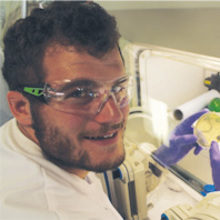Membership Q&A
Issue: Water
17 November 2014 article

This is a regular column to introduce our members. This issue, we’re pleased to introduce Peter Rowe.
Where are you currently based?
The GASCHEM (optimising GAS fermentation for the production of sustainable CHEMicals) team in University of Nottingham’s Clostridium Research Group.
What is your area of specialism?
Microbial fermentation and metabolic engineering.
And more specifically?
I work with Clostridium autoethanogenum, an anaerobic acetogen capable of gas fermentation. This organism has huge potential in the field of renewable energy as it can use gases rich in carbon monoxide, carbon dioxide and hydrogen as sole carbon and energy sources. It is capable of producing a range of commodity chemicals, including ethanol, acetate and 2,3-butanediol. This organism has been proven to produce such chemicals using industrial waste gas as a feedstock, and therefore can simultaneously reduce waste gas emissions and produce valuable chemicals.
Currently, genetic engineering tools available for the Clostridium genus are far behind those available for other organisms. My role within the team is to develop new tools for genome editing and metabolic engineering applications, with the aim of increasing the yield and range of chemicals produced by C. autoethanogenum.
Tell us about your education to date
I graduated last summer from the University of Manchester with a degree in Biotechnology with Enterprise. This included a year-long internship placement at AlerGenetica, a biotech start-up specialising in developing treatment for fungal allergies. There I worked on developing a strain of Aspergillus niger capable of secreting heterologous proteins at high titres.
Where did your interest in microbiology come from?
For me, human and plant biology is based around something very tangible that you can see and feel. I think microbiology has a greater level of intrigue because it is the study of something that in most cases you barely notice is there.
What are the professional challenges that present themselves and how do you try to overcome them?
Currently, I’m working on implementing a few new techniques that nobody else in the research group has worked on. I try and overcome the problems presented by these by thoroughly researching how similar techniques have been applied in other fields and luckily I’ve got a great team of people to talk through my problems with.
What is the best part about ‘doing science’?
I like the idea that I can find out some interesting things that nobody else has ever done.
Who is your role model?
When I was growing up it was Jonny Wilkinson, but in terms of science I’d have to say Craig Venter.
What do you do to relax?
Mostly sports, I play rugby, football and cycle a lot. I also really enjoy travelling when I have the free time, for instance I spend a couple of weeks this year hiking around Norway’s national parks.
What one record and luxury item would you take to a desert island?
For the record I would choose High Violet by The National. In terms of a luxury item I’d probably opt for a cafetière with an abundant supply of good coffee.
Tell us one thing that your work colleagues won’t know about you!
I have an irrational fear of cows.
If you weren’t a scientist, what would you be?
I’d like to think I would be doing something to do with sports and travelling, perhaps a ski instructor?
If you would like to be featured in this section or know someone who may, contact Paul Easton, Acting Head of Membership Services at [email protected]
